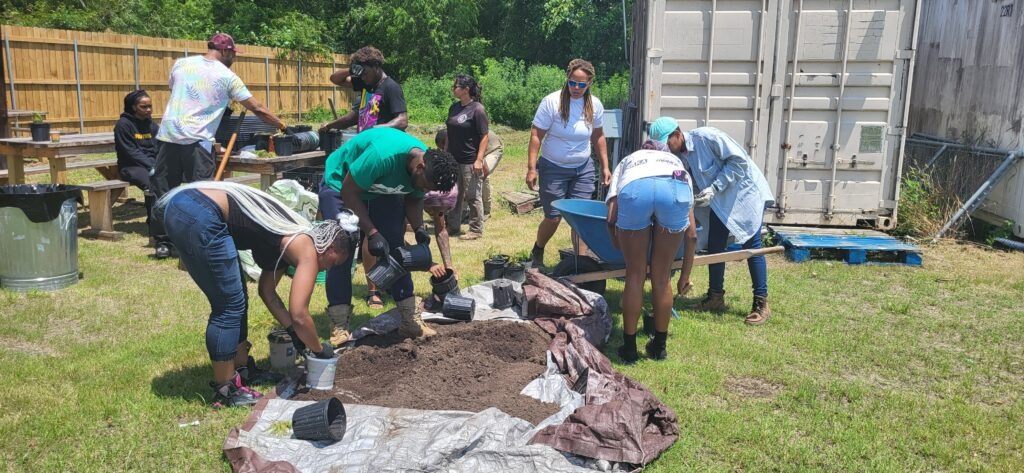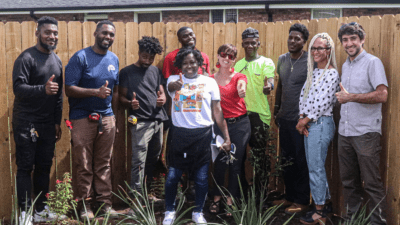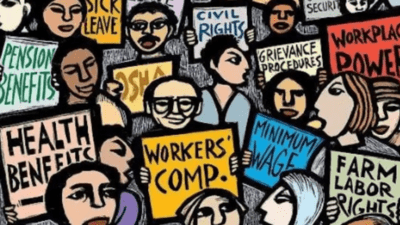This post is also available in: Español (Spanish) Kreyòl (Haitian Creole)
Increasing Black incomes to match those of comparable, aspirational cities could close the racial income gap in New Orleans and add billions to the local economy, according to a new report by The Data Center.
That report, titled “Potential Economic Impact of Increasing Income for Black New Orleanians,“ outlines the racial disparity around prosperity. Instead of focusing on the vast inequity between the incomes of White and Black New Orleanians, it argues for raising Black incomes in New Orleans to match Black incomes in peer cities like Atlanta, Charlotte, Houston, Nashville and Orlando.
While this may seem incremental and less ambitious than closing racial income gaps, it is an attainable first step, said Lamar Gardere, executive director of The Data Center, an independent research organization and WKKF grantee.
“We know that it’s possible because these folks have done it,” he said. “But something is not working here.”
For the past 20 years, more White New Orleans families have moved into the top fifth of wage earners, while more Black families have moved into the bottom fifth, the center’s analysis found.
If New Orleans could increase Black per capita incomes to match those in Houston, the overall economy would jump as much as $3.3 billion a year, The Data Center found. Match Atlanta, and the benefit jumps to $5 billion.
And all five comparison metros have considerably smaller racial income gaps than New Orleans, adding confidence to this incremental approach.
The potential for a strong minority-driven economy in New Orleans to rival other cities “becomes easier to see and harder to deny when you make this comparison,” Gardere said.
The report builds on research from the 2018 New Orleans Business Case for Racial Equity, which found that the city stands to gain $43 billion in economic output by closing the racial equity gap. The Data Center was a partner in that research and has since been examining pathways to realize those gains through its Systemic Inequity Collection white papers.
In this most recent report, The Data Center argues that raising the minimum wage is a start to economic prosperity. Louisiana is one of five states that do not have a state minimum wage, defaulting to the federally mandated rate of $7.25 an hour. It also has one of the largest populations of minimum wage earners in the country, making the potential impact of such a wage increase all the more striking.
Growing organized labor can also contribute to higher incomes. While participation in unions has declined in the last 50 years and organized labor has never been popular in southern cities, support for them has been on a recent upswing, even gaining support from Republican senators in Arkansas and Florida.
Additionally, New Orleans is primed to invest in industries that demonstrate the greatest upward mobility for low-wage workers – namely, construction and manufacturing.
Comparing New Orleans to other southern cities has its limits, Gardere said. Atlanta has long been a center of Black culture and economic opportunity. Houston has the oil and gas industry. Charlotte is a research and innovation hub, and Nashville and Orlando have bustling music and tourism industries.
New Orleans, however, has the potential to turn its greatest challenge into an economic engine. A city surrounded by water and prone to hurricanes, New Orleans is primed to lead a dynamic green economy in the face of climate change.
“It’s time to focus on what we’re good at – water management,” Gardere said.
Turning problems into solutions
It’s a focus that has bred success. When Arien Hall put down her violin and took a break from teaching music and gigging with local bands, she tapped New Orleans’ job-creating ecosystem of nonprofits and training programs to co-found her own stormwater management construction firm, Mastadonte. She saw combating climate change as an opportunity to uplift more businesses like hers, especially enterprises owned by people of color.
“As a Black woman from the South, it became of the utmost importance to me because we don’t have time to play around anymore,” Hall said.
The five-year-old firm has four employees and plans to hire two more by the end of the year. Public projects in New Orleans are calling for experts like her and her business partner, Luisa Abballe. Hall now takes what she has learned on the job and from tapping into New Orleans’ network of entrepreneurial nonprofits to give back, teaching the skills people need to join the green infrastructure workforce.
“One of the slogans we came up with when we were starting out was ‘Our problem is our solution,’” she said.
Mastadonte is a success story that bears repeating. Federal funding made available through the Bipartisan Infrastructure Act and the Inflation Reduction Act offer even greater opportunity for New Orleanians and Louisiana overall. And New Orleans has begun to invest in the process of growing a stronger workforce, starting at the very beginning.

Arien Hall with the Sankofa Community Development Corporation.
Growing New Orleans’ workforce
Voters in 2022 overwhelmingly approved a 20-year property tax to greatly expand access to early childhood education for low-income families, setting students up for success in school and in life and helping to nurture our future workforce.
At the other end of the education path, nonprofit agencies, community colleges and technical schools have created pipelines to tap the benefits of growing a green economy workforce. For example, Delgado Community College is building pilot programs to train, certify and license workers, not only in applicable skills but also in the science and strategy around the management of water and green infrastructure.
April Noble, with Delgado’s Water and Wastewater Technology Program, estimated that each time a worker in water management advances to a new job classification through training, certification or licensing, they earn $2,000 to $3,000 more in annual income.
“We are seeing a growth in interest because we are supplying those skills that they need,” she said. “But it’s not only the technical, hands-on approach. We focus on management as well, so we see that growth of interest from employers.”
Creating a Black professional class
Training is one thing. Doing business in New Orleans is quite another. To grow Black income in New Orleans, New Orleans must build its Black professional class. And to do that, the city must be attractive to businesses’ bottom lines.
“You’ll have some companies that will do good because that is the right thing to do. And then there are some companies that will do good because people’s lives are at stake,” said Allen Square, an entrepreneur and management strategist who served as the city’s chief information officer during Mayor Mitch Landrieu’s administration. “But then there’s some businesses where it’s got to be about economic interests.”
Partnering with businesses of color and hiring workers from the community must make financial sense to companies that habitually tap subcontractors and workforces that are majority White and from outside of New Orleans. The key is to get company leaders to pause and think about who they work with, who they hire and why.
“Obviously you hire from your networks,” said Square, who is Black. Having successful companies that are majority White partner with minority-owned businesses opens new pipelines and opportunities. “You put Black folks in business, they hire from their networks, and then you have more Black people making better wages.”
It requires intentionality to think beyond a job and understand the potential ripple effect of hiring a Black-owned business in a majority Black city.
“We need armies of people who are thinking that way because they believe in a better New Orleans,” Square said.
“You have to spend time with people who don’t look like you,” said Iam Tucker, a second-generation owner of a Black civil engineering firm and fierce advocate for collaborative efforts to build a stronger Black professional class. “You have to be in rooms with people who you may be uncomfortable around.”
That intentionality also extends to the city government’s management of the economic landscape. On one hand, Tucker said, regulations requiring large contractors to partner with minority-owned businesses should be strengthened so that smaller firms can get the experience they need to grow.
Conversely, regulations that dictate how best to approach water management infrastructure need to be strong to incentivize workers to get the training and certifications they need to thrive in that new professional space. Meeting those standards all but ensures they will earn higher wages, she said.
In the end, it will be businesses driven by the economic benefit of hiring Black workers and partnering with Black companies who will ultimately make the difference.
“What are you doing to create deep, sustaining change and how are we going to reward those people who are doing those things for the right reasons?” Tucker asked.







Comments